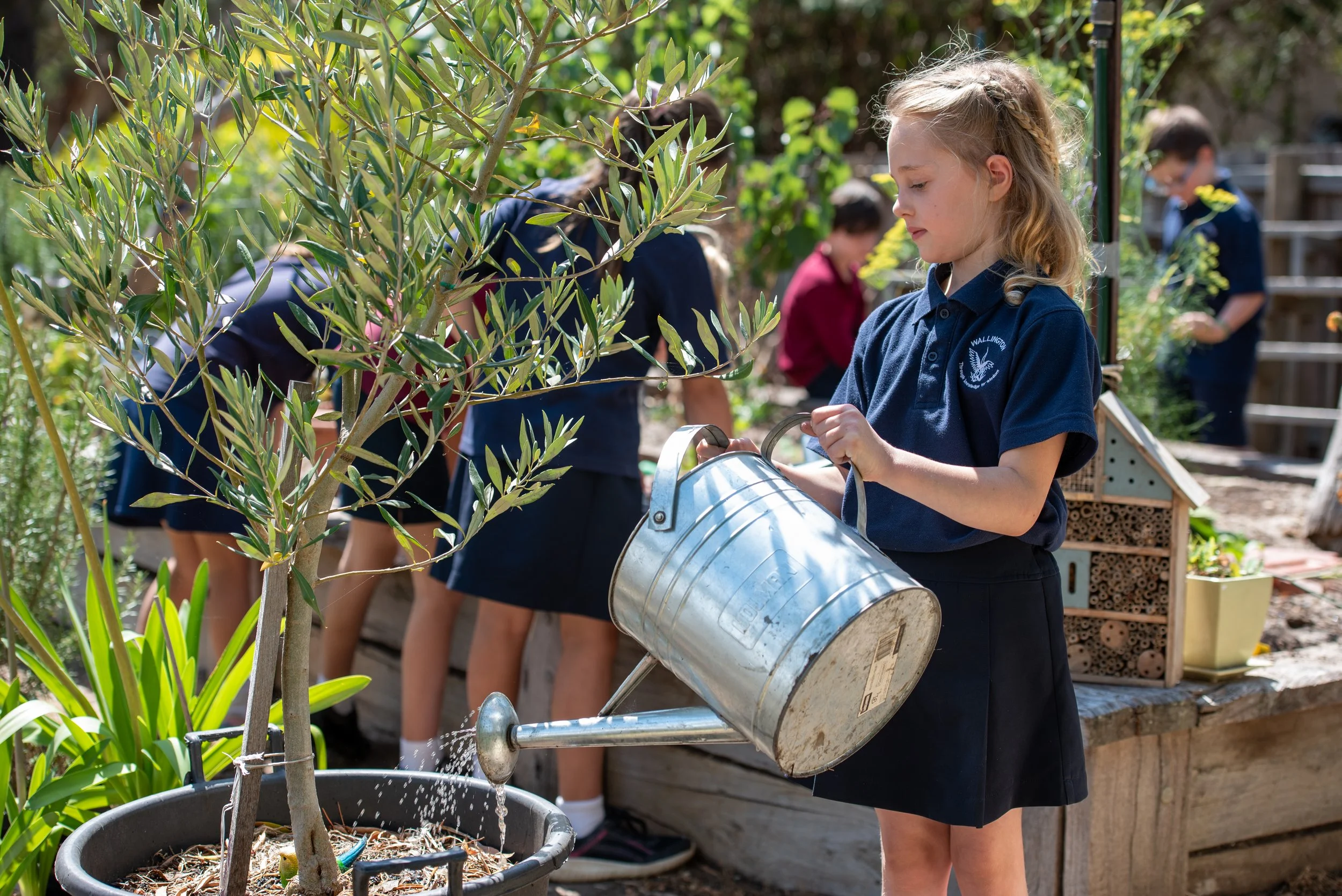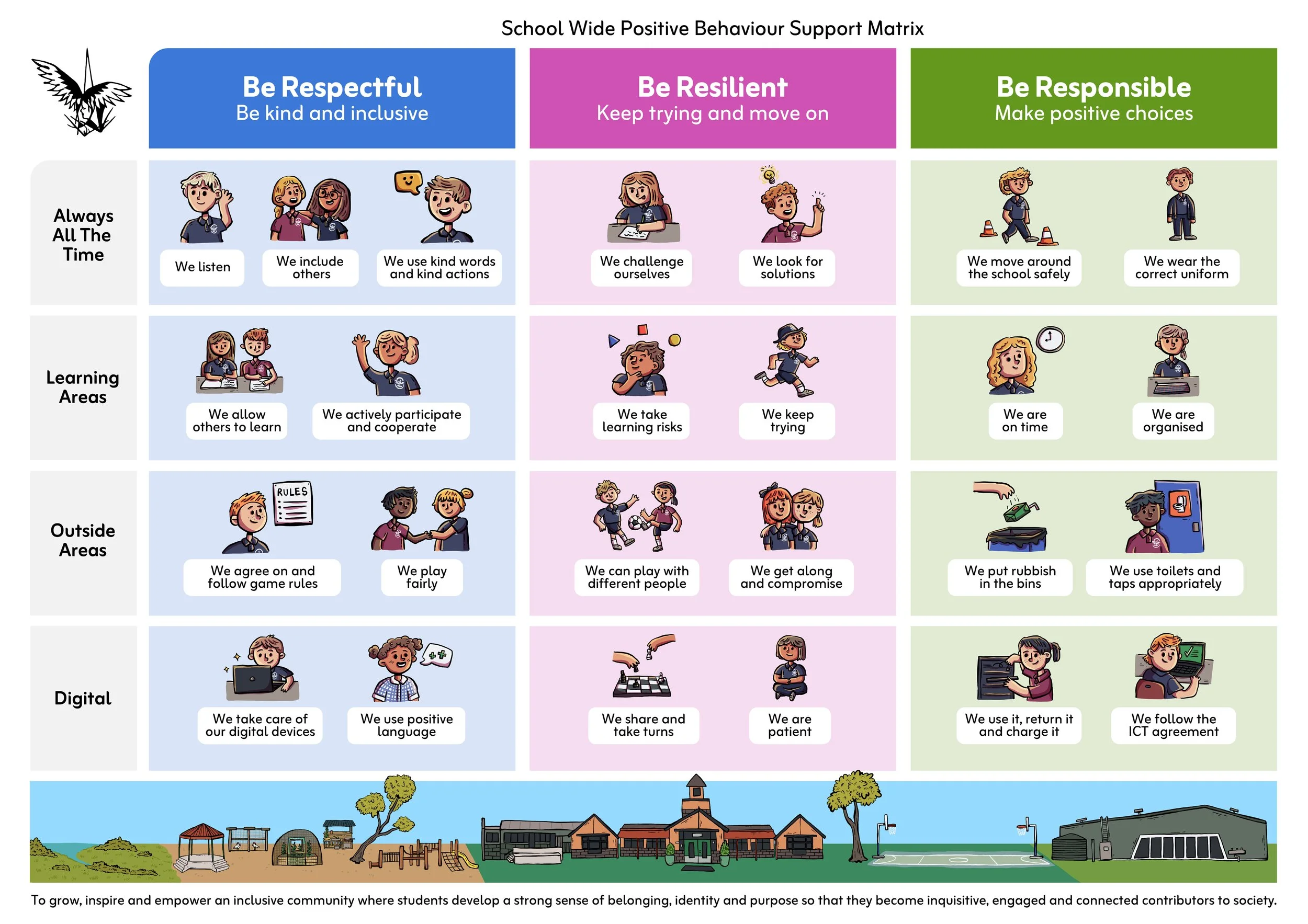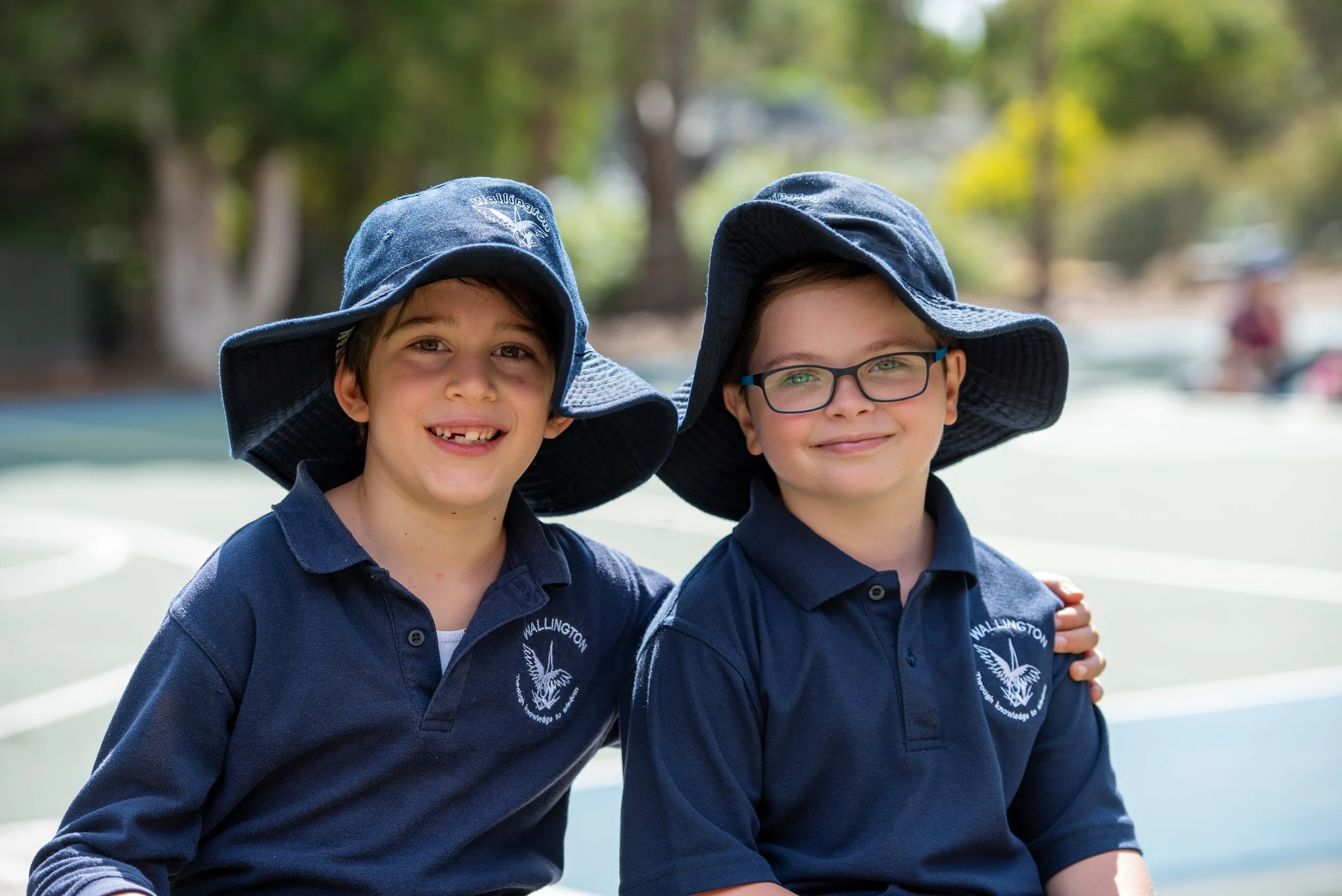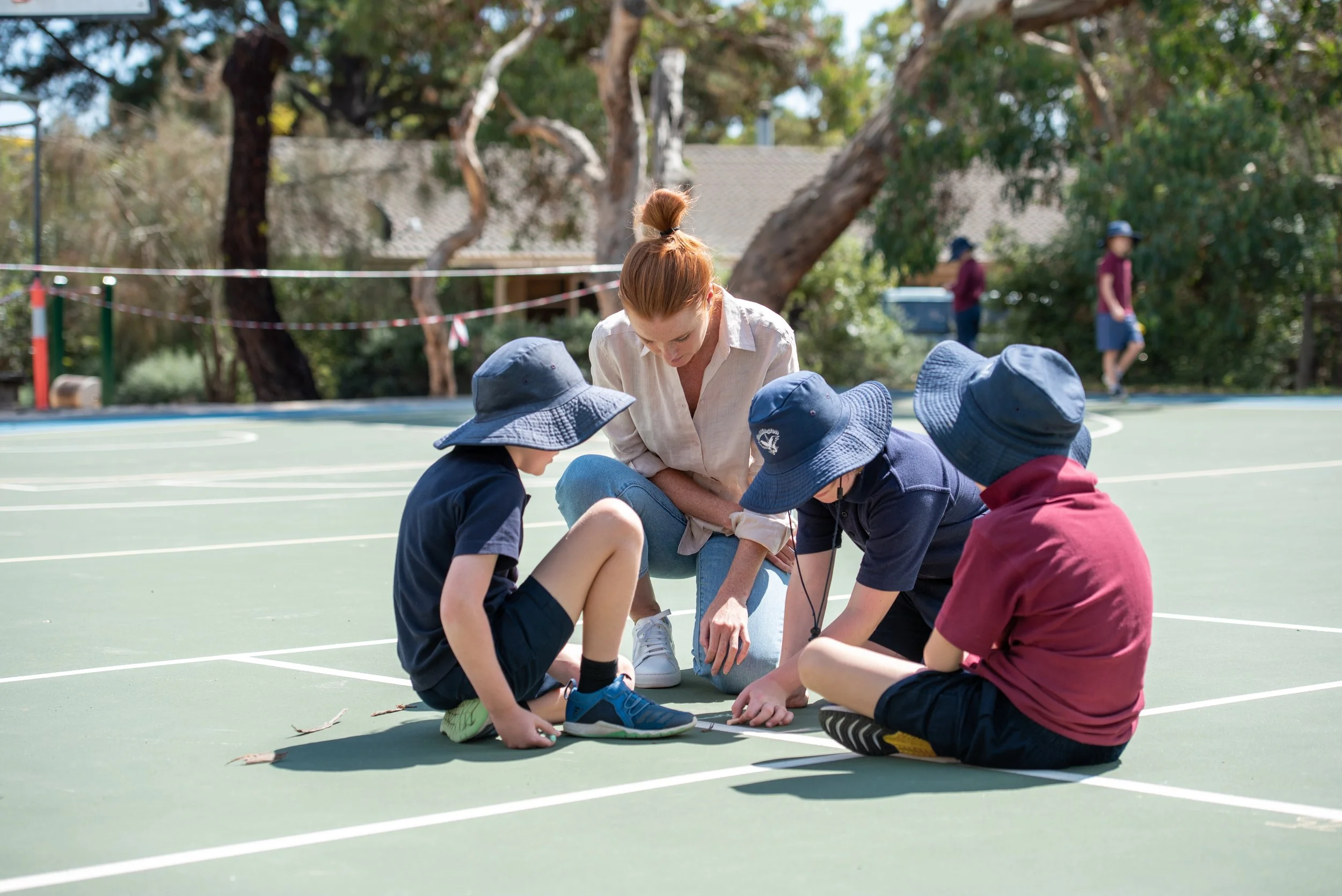Wellbeing
At Wallington Primary School, we prioritise student wellbeing through a comprehensive whole-school approach designed to foster growth, resilience, and positive relationships. Our practices integrate the Berry Street Education Model, School-Wide Positive Behaviour Support, the Resilience, Rights and Respectful Relationships program, and Restorative Practices, equipping students with lifelong skills and strategies to independently manage their wellbeing. We hold clear expectations for behaviour and teach these explicitly, in order to achieve our goal for all students to feel safe, happy, and ready to learn. By promoting respect, responsibility, and resilience, we cultivate a school community that values kindness, tolerance, and courtesy, while standing united against bullying and discrimination to ensure inclusivity for all.
Berry Street Education Model
The Berry Street Education Model (BSEM) is a research-based framework designed to support and enhance student wellbeing and learning. At its core, BSEM emphasizes a holistic approach that addresses the social, emotional, and educational needs of students. The model integrates five key domains: Body, Relationships, Stamina, Engagement, and Character, which together help create a supportive and nurturing learning environment.
Body: Focuses on the physical needs of students, including health, safety, and self-care, ensuring they are in a state that supports learning.
Relationships: Builds strong, positive connections between students and staff, fostering a sense of belonging and trust in the school community.
Stamina: Develops students' resilience and perseverance, helping them manage stress and overcome challenges.
Engagement: Encourages active participation and enthusiasm in learning, making education relevant and meaningful for each student.
Character: Promotes the development of personal values, ethics, and self-discipline, guiding students to become responsible and compassionate individuals.
Through the Berry Street Education Model, we aim to create an environment where every student can thrive academically, emotionally, and socially.
School-Wide Positive Behaviour Support
School-Wide Positive Behaviour Support (SWPBS) is an evidence-based framework designed to promote positive behaviour and create a supportive school environment. At its core, SWPBS focuses on establishing clear expectations for behaviour, recognizing and rewarding positive actions, and providing consistent support for all students.
Key Components of SWPBS:
Clear Expectations: We implement clear and concise behavioural expectations for students, which are communicated consistently across all areas of the school. These expectations help students understand what is required of them and how they should behave in different situations.
Positive Reinforcement: SWPBS emphasises the importance of acknowledging and rewarding positive behaviour. By recognising and celebrating students' successes and good behaviour, schools encourage continued positive actions and create a more motivating environment.
Consistent Support: The framework provides structured support for students who need additional assistance. This includes targeted interventions and strategies to address and improve challenging behaviours, ensuring all students have the support they need to succeed.
Data-Driven Decisions: Schools using SWPBS collect and analyse data on student behaviour to inform decision-making. This approach helps in identifying trends, monitoring progress, and adjusting strategies to meet the needs of the student population effectively.
School-Wide Collaboration: SWPBS involves collaboration among all members of the school community, including teachers, staff, students, and families. This collective effort ensures that everyone is working towards the same goals and supports a positive and inclusive school culture.
Resilience, Rights & Respectful Relationships
The Resilience, Rights and Respectful Relationships (RRRR) program is an initiative implemented in Victorian schools to promote the social and emotional wellbeing of students. This mandated program is designed to help children and young people develop resilience, understand their rights, and foster respectful relationships. The RRRR program is incorporated into the school curriculum through a sequence of lessons and activities and aims to enhance emotional intelligence, improve interpersonal skills, and support mental health. Parents can support by talking to their child about what they are learning, encourage discussions about resilience, rights, and respectful relationships, and by demonstrating respectful and resilient behaviours in their own interactions.
There are eight Social & Emotional Learning topics: Emotional Literacy, Personal Strengths, Positive Coping, Problem Solving, Stress Management, Help Seeking, Gender and Identity, Positive Gender Relationships.
Resilience: Developing students' ability to cope with challenges, manage stress, and bounce back from difficulties, building emotional regulation, problem-solving skills, and a growth mindset.
Rights: Educating students about their rights and responsibilities, including the right to safety and respect, through understanding and asserting personal rights, and respecting the rights of others.
Respectful Relationships: Promoting healthy and respectful interactions between students, staff, and the broader community, developing effective communication, empathy, and conflict resolution.
Restorative Practices
Restorative practices are a set of approaches used to build and strengthen relationships, resolve conflicts, and address wrongdoing in a constructive manner. Instead of focusing solely on punishment, restorative practices aim to repair harm and restore relationships by emphasizing accountability, empathy, and mutual respect.
Key Principles:
Building Relationships: Emphasises the importance of strong, positive relationships within the school community. By fostering trust and respect, restorative practices help prevent conflicts and promote a supportive environment.
Repairing Harm: When issues or conflicts arise, restorative practices focus on understanding the impact of the wrongdoing and working towards repairing the harm done. This involves open dialogue and a commitment to making amends.
Encouraging Accountability: Encourages individuals to take responsibility for their actions and understand their consequences. It aims to help them learn from their mistakes and make positive changes.
Promoting Empathy: Supports individuals in understanding and appreciating the perspectives and feelings of others. This helps build empathy and reduce the likelihood of future conflicts.
Involving All Parties: Involves everyone affected by a conflict or wrongdoing in the resolution process. This collaborative approach helps ensure that all voices are heard and contributes to a more comprehensive resolution.





